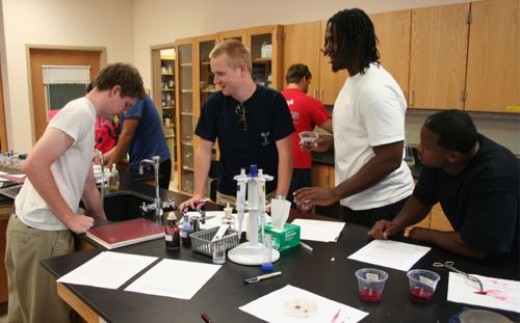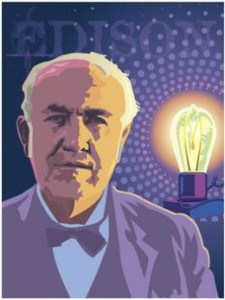Inquiry-Based Learning
A scenario

Figure. Source:http://edtecher.hubpages.com/hub/project-based-learning-science-lesson-plans-pbl#
In recent years, we have heard people advocating inquiry-based learning everywhere in education. Some teachers may say: I am using inquiry-based approach in my classes ..I ask students questions.. and I also let them do experiments .. Is it inquiry-based learning when we do these things? Lets look at an example.
John is a high school chemistry teacher. He used to teach chemistry by making nice PowerPoint presentations and asking students to memorize what was taught. But he found that students forget about everything very soon. Now he has decided to make a change and wants to try inquiry-based learning. After he presents the PowerPoint presentation, he poses questions for students to think about, and then asks students to discuss these. In order to let students have some hands-on experiences, he lists a number of experimental procedures and asks students to follow the list. After doing all of this, he has found that students are not really learning more than they used to. He wonders why, and starts to doubt about the effectiveness of inquiry-based learning.

Figure. source: http://nortonbranch.akronlibrary.org/children-2/
Experts comment: It is nice for John to try this new approach. There are questions, discussions and experiments in his class, which look like inquiry. However, this is just a series of activities, and not inquiry yet. In Johns class, everything is prearranged, the questions are prepared by the teacher, and the experimental procedures are fixed. Students just follow teachers instructions. This is actually still similar to his previous didactic approach.
In order to make students experience authentic inquiry, we better let them ask questions, the questions that really matter to them and they really want to know about. Then we can help them to find answers. In the process of finding out the answers, they may need to propose theories and hypotheses, and do experiments to test these hypotheses. Students may also need to discuss among themselves for the purpose of solving the problems, which may lead them to revise their original theories
and find better answers. The whole process should be coherent, rather than consisting of isolated events. In order to engage students in inquiry, teachers first need to have a sound understanding of inquiry-based leaning. Please check the theory bellow to understand more.
Definition
Inquiry learning is a student-centered approach to engage, motivate and challenge students in active learning, whereby they discover meaning of newly attained knowledge and increase their deep understanding of encountering problems, topics, or issues that are solved through a systematic method of collecting and analyzing information.
Inquiry learning provides students the opportunity to construct the understanding necessary for deep learning, for instance, when targeting:
-
in-depth exploration of issues, themes or problems without predefined correct answers
-
practical knowledge which may not be fixed and permanent, but may be open to questioning and alternative hypotheses
-
motivating and engaging learners into learning projects, problems and processes of interest
Basic Assumptions and Principles
The philosophy of inquiry learning is rooted in the work of Piaget, Vygotsky and Dewey among others that emphasize the active role of learners during learning process where understanding is built through
-
Developing and advancing conceptual mental frameworks by the active learner
-
Making progress by sharing resources produced by inquiry partners, and building on everyone’s work.
Drawing upon the constructivist learning theories and developing during the discovery learning movement of the 1960s this pedagogical method has been shown to result in better performance of students in terms of their generic skills, subject knowledge, and social abilities.(Anderson, 2002)
| Teacher Role | |
|---|---|
| As dispenser of knowledge | As coach and facilitator |
|
|
| Student Role | |
| As passive receiver | As self-directed learner |
|
|
| Student Work | |
| Teacher-prescribed activities | Student-directed learning |
|
|
Classroom Implication and Teaching Strategies
Learning activities are organized in a cyclic way. Students first ask a question, which leads to the desire for answers to the initial question. This is followed by an exploration, hypothesis, data collection, and answer to the initial question. Inquiry learning emphasizes constructivist ideas of learning, so knowledge is constructed from conceptual mental frameworks, new information, and interpersonal experiences. Therefore the learners discuss and reflect on the newly acquired knowledge, which, in turn, leads to more questions and further investigations. Thus the inquiry process is motivated by personally relevant questions and investigation of those questions; and it is cyclical and social. The 5 steps below depict an inquiry cycle. But at any stage, students may need to return to an earlier one. For example, difficulties during Create may require that the students do more research.
-
Ask? It begins with the desire to discover. Meaningful questions are inspired by genuine curiosity about real-world experiences.
-
Investigate: Taking the curious impulse and putting it into action is what we call the investigation process. At this stage the learner begins to gather information: researching resources, studying, crafting an experiment, observing, or interviewing, to name a few.
-
Create: As the information gathered in the investigation stage begins to coalesce, the learner begins to make connections.
-
Discuss: At this point in the circle of inquiry, learners share their new ideas with others. The learner begins to ask others about their own experiences and investigations.
-
Reflect: Reflection is just that: taking the time to look back at the question, the research path, and the conclusions made.
The process finishes when those involved in the inquiry are satisfied with the knowledge and outcomes that have emerged.
Resources
The Cambridge handbook of the learning sciences ?Chapters?
Cobb, P. & McClain, K. (2006). Guiding inquiry-based math learning. In R. K. Sawyer (ed.), The Cambridge handbook of the learning sciences (pp. 171-186), Cambridge, MA: Cambridge University Press.
?NAPLeS Webinar Series by Marcia Linn: Inquiry Learning
(http://isls-naples.psy.lmu.de/intro/all-webinars/linn/index.html)
Presentation Slides: Inquiry Learning
(http://isls-naples.psy.lmu.de/intro/all-webinars/linn/linn-slides.pdf)
Required Reading
Linn, M. C., Eylon, B-S, Rafferty, A. & Vitale, J. (in press). Designing Instruction for Inquiry Instruction.
Chiu, J,. & Linn, M. C. (2011). Knowledge Integration and WISE Engineering.Journal of Pre-college Engineering Education, 1(1), 1-14.
[Online](http://docs.lib.purdue.edu/jpeer/vol1/iss1/2/)
Linn, M. C. & Eylon, B.-S. (2011).Science Learning and Instruction: Taking advantage of technology to promote Knowledge Integration.New York: Routledge.
[Online](http://www.routledge.com/books/details/9780805860559/)
Key Works
-
Orchestrating Inquiry Learning by Karen Littleton, Eileen Scanlon, Mike Sharples
-
Teaching and Learning Through Inquiry: A Guidebook for Institutions and Instructors by Virginia S. Lee
-
Guided Inquiry: Learning in the 21st Century by Carol C. Kuhlthau, Ann K. Caspari and Leslie K. Maniotes
-
Learning Together Through Inquiry: From Columbus to Integrated Curriculum by Kathy G. Short, Jean Schroeder and Julie Laird
Successful Examples
References
-
Anderson, R. D. (2002). Reforming science teaching: What research says about inquiry. Journal of Science Teacher Education, 13(1), 1-12.